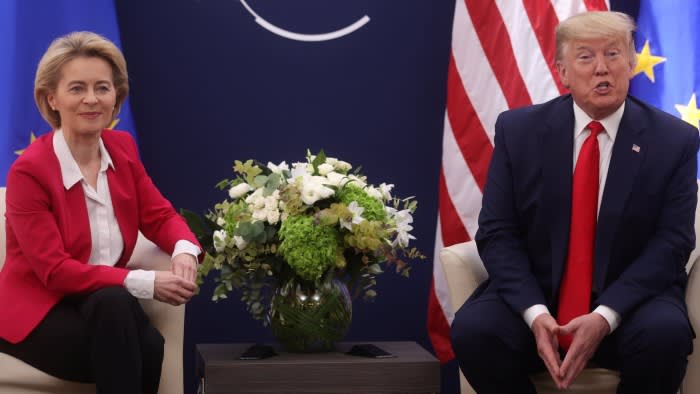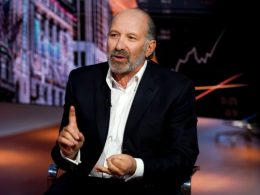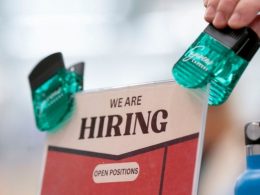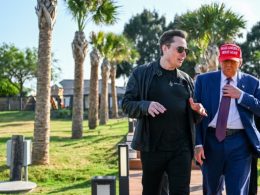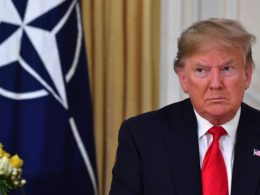Good morning. Today, I write on how Europe is prepared — or at least is telling itself it has prepared — for the US election, and our parliament correspondent has news on the latest crackdown on Chinese online retailers.
Judgment day
In 2020, European Commission president Ursula von der Leyen’s cabinet set up a special TV room in the EU’s headquarters to watch the US election results roll in. This time, her aides would be wise to make sure there’s space to hide behind the sofa.
Context: America goes to the polls today to elect their next president, with Republican Donald Trump and Democrat Kamala Harris in a virtual dead heat, according to most of the opinion polling. The dollar and US government debt yields fell yesterday in signs investors had pared their bets on a Trump victory, as both candidates focused their final hours of campaigning on the critical swing state of Pennsylvania.
Months of pearl-clutching, prophecies and attempted preparations by the EU for a possible return of President Trump end today as polls open, in a race that could have seismic impacts on European defence, trade and generations of transatlantic policy.
“In 2016, we were basically hoping for the best,” said one senior EU diplomat, referring to Trump’s first election. “Now, at least there has been some preparation . . . in theory.”
That preparation has been done by major EU capitals, but also inside the commission. A small working group set up earlier this year has drawn up potential response strategies to Trump, including a pre-cooked trade deal to avoid his threat to impose blanket import tariffs, and possible initiatives to partially offset any withdrawal of US military support to Europe.
But most senior officials around the EU are privately sceptical about the tangible benefits of such work, aside from providing a theoretical comfort blanket should Trump win.
“We say we know what he is like,” said a senior EU official involved in the Trump-proofing talks. “[But] we don’t know what he is like.”
Many also caution against the complacency of interpreting victory for Harris as a major relief for the EU. On structural, long-term issues such as Europe’s widening competitiveness gap with the US and its over-reliance on America for defence and security, the EU needs to push ahead with remedies regardless of who is the next US president.
According to internal assessments seen by the Financial Times, the commission believes that a Harris administration would broadly continue Joe Biden’s approach, including existing soft protectionist policies and viewing China as the major geopolitical priority, even if that means collateral damage against Europe.
“Whoever wins those elections, we will work with Kamala Harris, we will work with Donald Trump. I have no doubt,” Nato secretary-general Mark Rutte said yesterday.
Though Rutte offered a rather sobering reference to back up his confidence: “It is in our interest here, but also in the United States’, because they are not in this to repeat the mistake after the first world war of withdrawing from Europe.”
Gulp.
Chart du jour: Deindustrialisation
Over the past three years, Europe’s largest economy has slowly but steadily sunk into crisis. But what is happening now is “unprecedented”.
Unboxing
It is “almost impossible to control” the contents of parcels entering the EU from China and elsewhere, the EU’s incoming trade commissioner has admitted, as the bloc tries to better police foreign online retailers, writes Andy Bounds.
Context: Consumers are increasingly ordering cheap goods from websites such as China’s Temu and Shein. The European Commission has launched an investigation into Temu for allegedly selling counterfeit goods.
Maroš Šefčovič told a European parliament confirmation hearing yesterday that the EU had to introduce a proposed new customs regime two years early, in 2026 rather than 2028, as the number of packages hits 4bn this year.
He said some imports, most of which arrive by plane, were dangerous and did not comply with EU standards.
When asked by Green MEP Anna Cavazzini what the EU should do about the “unsafe and illegal goods flooding our market”, Šefčovič said it was “almost impossible to control without proper tools”.
The planned reform would introduce an EU customs authority and centralise data. It would also scrap a threshold exempting items worth less than €150 from duties. In 2023, 2.3bn in customs-exempt items were imported into the EU, according to the commission.
But member states have opposed the new legislation for years, over fears of transferring more powers to Brussels. Šefčovič now wants them to agree a joint position in the first half of next year, so it can come into force the following year.
He also said national enforcement teams for product safety needed more training and co-ordination.
What to watch today
-
EU finance ministers meet.
-
Nato secretary-general Mark Rutte meets Italian Prime Minister Giorgia Meloni in Rome.
Now read these
Are you enjoying Europe Express? Sign up here to have it delivered straight to your inbox every workday at 7am CET and on Saturdays at noon CET. Do tell us what you think, we love to hear from you: europe.express@ft.com. Keep up with the latest European stories @FT Europe





